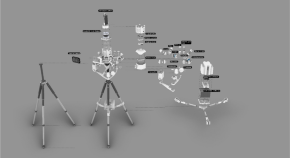
Collection
Phygital Intelligence
- Submission status
- Closed
Architecture is currently facing a physical-digital era that requires a re-consideration and re-assembly of traditional concepts. From digital twins to meta-universes, a series of technological trends have projected the futures of architectural production and inhabitation in the planetary scale. From global warming, geopolitical wars to the pandemic, a series of social and ecological upheavals have also unveiled the urgency to re-define the relationship between globalization and locality
To propose new methodologies and new tools within the architectural ontology of the phygital future, we need to fundamentally rethink the boundary between the virtual and the real. What is the future of the relationship between physical space and virtual intelligent technologies? Will they coexist in parallel, or will they integrate and synergize together?
To meet the challenges of the current existential crisis, we also need to fundamentally rethink the relationship between architecture, nature, and human society in this phygital era. Is there a way in which the phygital nature of architectural production and inhabitation could provide a conceptually new model of sustainability as opposed to merely offering more engineering solutions?
As the theme of DigitalFUTURES 2023, Phygital Intelligence intends to promote a series of scholarly dialogues on these technological, social and ecological transformations in architecture. The key objective is to redefine the term "digital twin" and to investigate the role of phygital intelligence in architectural production in all the transcended territories of the virtual and the real, the individual and the collective, as well as the global and the local.
Editors
-
Philip F. Yuan
philipyuan007@tongji.edu.cn Tongji University, China
-
Chao Yan
yanchao@tongji.edu.cn Tongji University, China
Articles (9 in this collection)
-

-
Robotic 3DCP fabrication of custom-fit slabs for irregular pontoons
Authors (first, second and last of 6)
- João Ribeiro
- António Morais
- Paulo J. S. Cruz
- Content type: Case study
- Open Access
- Published: 17 April 2024
- Article: 14

-
Imag(in)e nature: imaging energetic footprint of urban environments through multispectral data acquisition
Authors
- Mark Balzar
- Zeynep Aksöz Balzar
- Galo Moncayo Asan
- Content type: Research article
- Open Access
- Published: 03 April 2024
- Article: 13

-
DeepCraft: imitation learning method in a cointelligent design to production process to deliver architectural scenarios
Authors
- Peter Buš
- Zhiyong Dong
- Content type: Research article
- Open Access
- Published: 02 April 2024
- Article: 12

-
Human–machine collaboration using gesture recognition in mixed reality and robotic fabrication
Authors
- Alexander Htet Kyaw
- Lawson Spencer
- Leslie Lok
- Content type: Research article
- Open Access
- Published: 15 March 2024
- Article: 11

-
On plastic development of timber structures based on 3D interactive vector-based graphic statics (VGS)
Authors (first, second and last of 4)
- Sylvain Rasneur
- Denis Zastavni
- Jean-Philippe Jasienski
- Content type: Research article
- Open Access
- Published: 08 March 2024
- Article: 10

-
Drawing a blank – design modelling composite timber elements
Authors
- Tom Svilans
- Mette Ramsgaard Thomsen
- Content type: Research article
- Open Access
- Published: 06 February 2024
- Article: 6

-
AI in architecture and engineering from misconceptions to game-changing prospects
Authors
- Michal Sourek
- Content type: Review article
- Open Access
- Published: 02 February 2024
- Article: 4

-
Brain-computer interface based generative design framework: an empirical multi-domain application exploration based on human-factors and form-generation interactive mechanisms
Authors (first, second and last of 7)
- Zhe Guo
- Zihuan Zhang
- Philip F. Yuan
- Content type: Research article
- Open Access
- Published: 01 February 2024
- Article: 3



